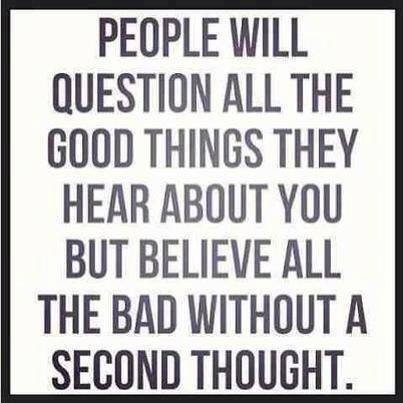10 Ways to Secure Your Professional Credibility!
If you have read Black Sales Journal before, you know of my obsession with the mechanics of the business relationship and how it affects the sales process and the fate of capable sales professionals. Now, as important as that may sound, it is even more crucial in its impact to the Black sales professional.
Think about this graphic statement – “People will question all the good things they hear about you but believe all the bad without a second thought!”
__________________________
This statement speaks to the nature of all relationships, and especially business relationships. In business relationships, you are obviously under scrutiny. You may eventually need references, certifications, and even credentials to get the customer’s confidence. The prospective customers will go as far as to check references, interview you, and re-interview you regarding your ability to be a good vendor or sales professional.
If you have made the sale, you probably have done it by ‘jumping some hurdles’, and ‘passing the muster’ and all of this is to your credit. After all of that ‘investigation’, your relationship is still fragile because of the premise above.
Credibility Is Indispensible
I talk extensively about the ultimate benefits of building credibility in BSJ 4/16/12 – Credibility – Can’t Buy It; You’ve Got to Earn It! But… it is fragile, and even more fragile when you are not the same color as the decision maker.
Note these tips to building credibility from that important post:
Sources of Credibility:
Appearance - Appearance is important. Dress as a professional. No one takes a clown seriously, and if you don’t dress properly, they won’t give more than a laugh either. Always be presentable. Remember, you represent your organization and yourself…there is no casual day. Don your uniform, it will keep you in character, and set you apart from those that don’t know the drill.
Be Client Focused - Use every interaction, meetings and, to reinforce that you are client focused. Know your clients needs and anticipate the ones they will need in the future, and exhibit it. If you take care of your clients, they will take care of your company, and you!
Be Responsive – Do what you say you are going to do, by when you say you are going to do it. Answer the phone, return phone calls, and be on time for appointments.
Communicate Often and Early – Don’t assume anything and deliver bad news as soon as possible.
Be Discreet – Never share customer information with other customers…never. Once you do, in an effort to drop names or seem important, your customer will assume that you will share information about their operation with others as well. Your quest will be over before it starts if you do that.
Exhibit integrity - Always tell the truth. If you don’t know the answers, then admit it. Always be the corporate citizen that you would like to work with. No jokes about race, disability, ethnicity or otherwise.
Be an Expert - Always know your own product or service. Know your customer’s industry
Be a Master of the Sales Process – Know how to probe, support, summarize, and close, and when to do it. Moving the process along, without heavy pressure helps to create urgency without seeming like a “snake-oil salesman.”
Always Have References – It gives credibility when you can show who believes in you. It shows preparedness to have references including phone, address, and titles ready to hand to a customer. Make sure you have references
Have Proof Sources – It is wise to always have proof sources for the claims of your company’s product. A buyer/customer will be impressed when you can provide names of customers, especially customers within your prospect’s industry. Make sure you have permission from those who you will use.
Some Things You Can’t Change
The vexing problem of the statement above is that you cannot change human nature. That human nature leads people to be doubters and even quickly turn to nonbelievers. With this in mind, develop strong relationships as best you can. Avoid any behavior that could rob you of your valuable credibility. That means avoiding jokes, discussions about religion, references to politics, and obviously race. Check out this post for some guidance as well: Black Sales Journal 1/3/11 – The Three Unmentionables for the Black Sales Professional!
This job is hard enough without self-inflicted wounds. Stick to the business of selling and making money.
Always remember, be the professional!
 June 15, 2015
|
Posted by Admin9!
June 15, 2015
|
Posted by Admin9!

 Categories:
Categories:  Tags:
Tags: 

Your Comments